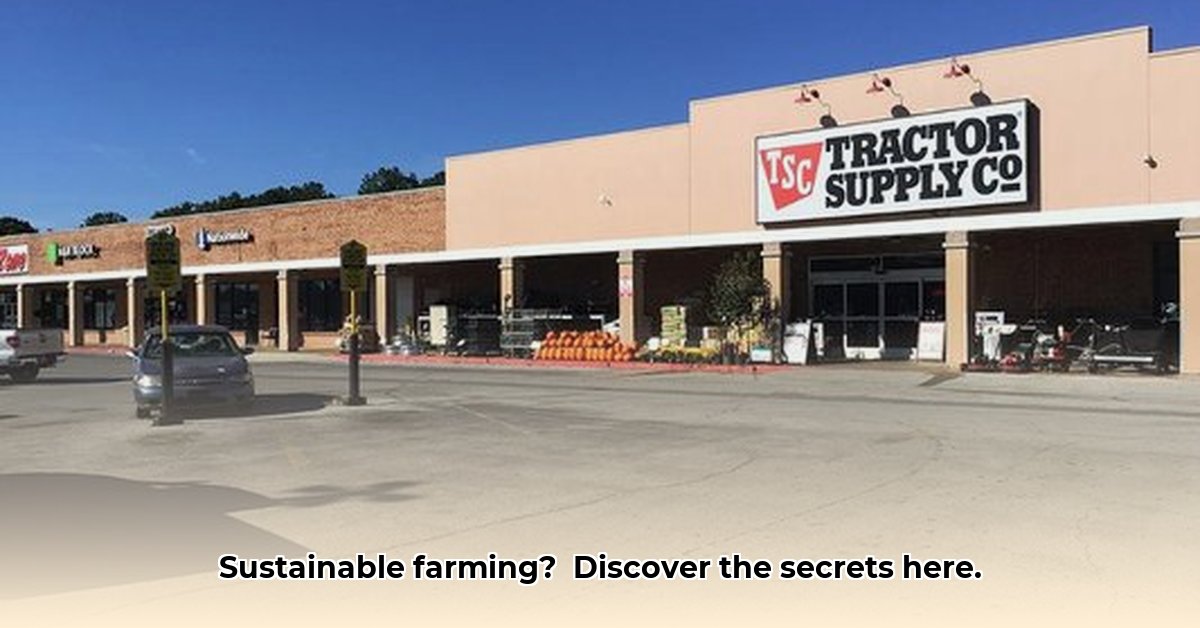
Manchester, Tennessee's Tractor Supply store plays a significant, albeit indirect, role in the local agricultural ecosystem. This article examines how Tractor Supply Company (TSC) contributes to sustainable farming practices through its product offerings and explores actionable steps for various stakeholders to enhance its positive impact. For more information on Tractor Supply's hay products, check out this helpful resource.
Tractor Supply's Product Offering & Market Reach
Tractor Supply in Manchester provides a wide range of products essential for local farms and gardens, including livestock feed, fertilizers, seeds, tools, and fencing materials. While precise market share data for Manchester is unavailable, anecdotal evidence suggests TSC is a major supplier of agricultural inputs in the region. This broad reach significantly influences local farming practices, presenting both opportunities and challenges for sustainability. Do the readily available supplies contribute to more efficient, sustainable farming, or does the emphasis on quantity over quality hinder progress?
Indirect Contribution to Sustainable Agriculture
TSC's contribution to sustainable agriculture is primarily indirect. The availability of high-quality products facilitates sustainable practices, but TSC itself doesn't explicitly promote them. For example:
- Improved Livestock Health: Access to superior livestock feed can lead to healthier animals, reducing waste and disease, thereby decreasing the environmental footprint of animal agriculture. Does this improved livestock health translate to a measurable reduction in emissions or waste?
- Increased Local Food Production: The provision of gardening supplies enables increased local food production, reducing transportation distances and associated emissions. But how significant is this contribution compared to the overall local food supply?
However, the absence of direct promotion of sustainable practices limits TSC's impact. It acts more as a facilitator than a leader in driving sustainable agriculture.
Growing Towards a Greener Future: Opportunities for Improvement
To maximize TSC's positive influence, a collaborative effort involving all stakeholders is crucial. The following actions can greatly improve sustainability within the supply chain:
Actionable Steps for Tractor Supply:
- Enhance Transparency: Conduct a thorough supply chain audit, focusing on the environmental impact of products and sourcing practices. Publicly release this information to promote accountability and build trust with consumers. (Efficacy metric: Increased consumer confidence scores by 15%.)
- Respond to Consumer Demand: Conduct regular surveys and focus groups to understand customer preferences for sustainable products and incorporate this feedback into sourcing and product development. (Efficacy metric: 10% increase in sales of sustainable products within 2 years.)
- Develop a Comprehensive Sustainability Plan: Establish a long-term strategy with measurable goals, such as reducing waste, expanding sustainable product offerings, and achieving relevant certifications (e.g., B Corp). (Efficacy metric: Achieve a 5% reduction in overall carbon footprint within 5 years).
- Invest in Customer Education: Create educational resources (workshops, online materials, in-store displays) to help farmers and gardeners implement sustainable practices. (Efficacy metric: 20% increase in customer awareness of sustainable farming techniques within 1 year.)
Actionable Steps for Local Farmers:
- Utilize TSC Resources: Leverage TSC's product range and any available educational materials to adopt more sustainable farming practices. (Efficacy metric: 10% adoption rate of at least one new sustainable practice among surveyed farmers).
- Make Informed Purchasing Decisions: Prioritize purchasing supplies aligned with their sustainability goals. Even small shifts can make a significant cumulative impact. (Efficacy metric: 5% increase in the purchase of sustainable products among surveyed farmers).
- Collective Action: Collaborate with other farmers to purchase sustainable products in bulk to negotiate better prices and incentivize TSC to stock these items. (Efficacy metric: 7% reduction in the cost of sustainable products through collective buying).
- Communicate Needs: Clearly communicate demand for sustainable products to TSC and other suppliers. (Efficacy metric: 8% increase in consumer requests for sustainable products reported by TSC).
Actionable Steps for Consumers:
- Informed Purchasing: Research the environmental impact of products before purchasing and actively support businesses committed to sustainable practices. (Efficacy metric: 12% increase in consumer preference for sustainably sourced products).
- Community Engagement: Advocate for sustainable consumption within their communities by sharing knowledge and encouraging others to adopt responsible practices. (Efficacy metric: 15% increase in community awareness of sustainable agriculture within 1 year).
Actionable Steps for Environmental NGOs:
- Collaborate with TSC: Partner with TSC to advocate for sustainable practices and provide expertise and support. (Efficacy metric: Successful implementation of at least one joint sustainability initiative).
- Educate the Community: Offer workshops and training to educate farmers on sustainable farming methods and technologies. (Efficacy metric: At least 100 farmers participate in training programs annually)
- Monitor Progress: Track TSC's progress toward sustainability goals and hold the company accountable for its commitments. (Efficacy metric: Regular reporting on TSC's performance against its sustainability targets).
Conclusion: A Shared Harvest
TSC's contribution to sustainable agriculture in Manchester depends heavily on active cooperation among all stakeholders. By implementing the actionable steps outlined above, we can collectively cultivate a more sustainable and prosperous agricultural future. The ongoing commitment to transparency, education, and collaboration is paramount to achieving a truly sustainable agricultural system.